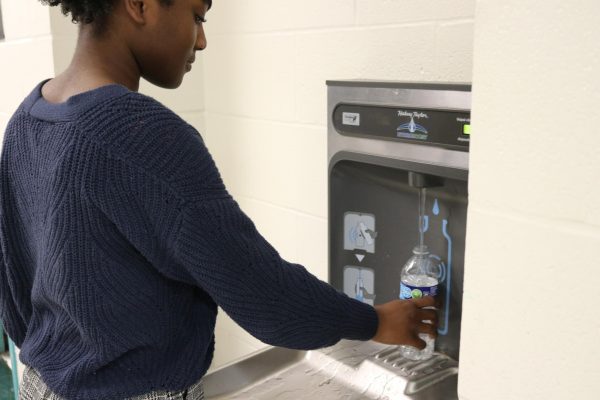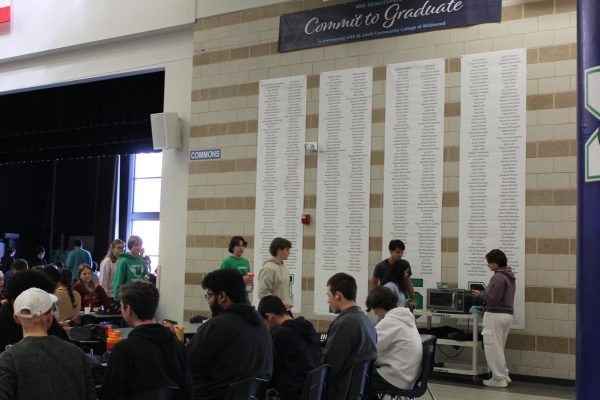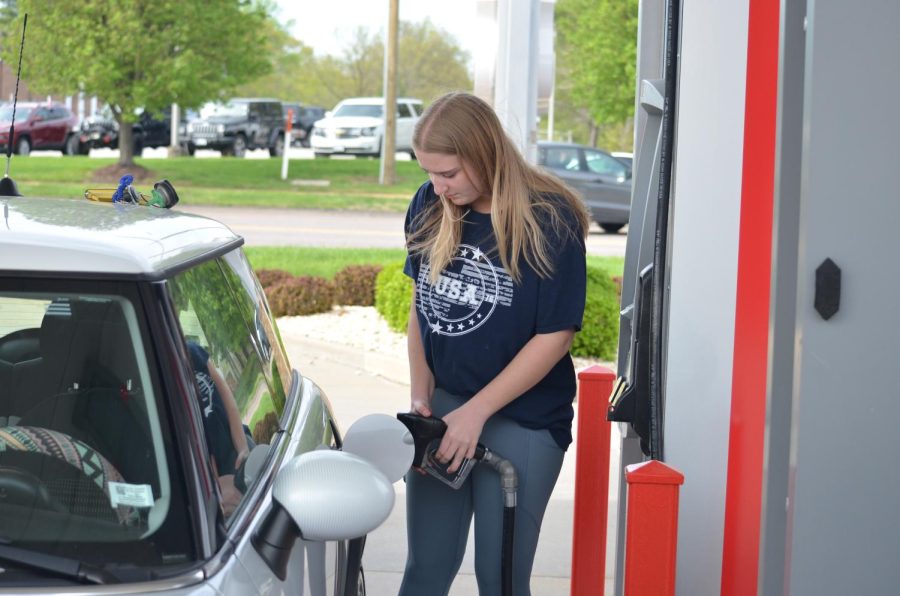Gas On The Rise: Increased Sanctions on Russia Led to Gas Price Increases
Media by Jacob Robinson
Aubrey Adams, junior, puts gas in her 2010 Mini Cooper at Petro-Mart for about $50, a jump from her usual $37. This is due to the increase in gas prices in response to the impending invasion of Ukraine by Russia. The increase is mainly caused by increased sanctions by both the U.S and other countries who have taken Russian oil off the market.
Aubrey Adams, junior, usually spends $37 to fill up the tank of her 2010 Mini Cooper. Since the rise in prices, she now pays about $50.
“I feel trapped because I have to stay home more often,” Adams said. “Now, I have to be more conscious of my spending.”
Driving is her way to clear her mind or go to hang out with friends.
Although Adams’ parents pay for her gas money, she is still concerned about gas prices.
“I don’t want to waste my parents’ money,” Adams said.
In early February, gas prices started to rise in response to the impending invasion of Ukraine by Russia. The increase is mainly caused by increased sanctions by both the U.S and other countries who have taken Russian oil off the market.
According to the National School Transportation Association, roughly 26 million kids board school buses on a daily basis. RSD is responsible for 13,600 of that number.
Mike Heyman, RSD director of transportation, said the district is able to handle the situation.
“In regards to transportation, the district will have no disruptions,” Heyman said.
The district buys gas for a cheaper price because it buys in bulk, Heyman said. Currently, unleaded gas is about $3.95, and the district buys it for $3.21. Diesel is sold for about $4.25, and the district only pays $3.52.
Transportation disruptions are not likely, Heyman said. The budget will be affected because of a rise in fuel costs, he said, but the district’s finance department has fully anticipated and prepared for the increase in prices.
Almost 50 percent of the buses in the district are unleaded buses. Heyman said the transportation department is working its best to replace diesel buses with regular buses in hopes of saving money and helping the environment.
The fuel budget from 2017 to 2020 decreased by $197,584. This year, the transportation department had planned $539,896 for the budget. Heyman said that in response to the price increase, the budget is planned for $1,143,137.
Some local businesses such as Three Bay BBQ and Bakery, which is located in the Phillips 66, on Clayton Road, aren’t seeing much of a concern with the rise in gas prices, but are still recovering from the decrease in the volume of gas sold caused by the pandemic. Rick Grosz, is one of the owners of Three Bay BBQ and Bakery, and has been impacted by the change in gas prices.
“Our gasoline margins are based on our costs and what we sell at street price,” Grosz said.
Dave Dyer, owner of Claymont Auto Repair at the corner of Kehrs Mill and Clayton Roads, hasn’t seen a massive rush to the pumps or an increase in panic. The only difference in cost is credit card fees. Back when gas prices were $2 a gallon, customers could get about a 3 percent credit card fee on $2. Since the rise in prices, credit card fees have doubled with it now at $4.
“People that need gas, need gas,” Dyer said.
Prices have risen before during the 70s and 80s, and about 10 years ago, they were over $4, Dyer said..
“It’s nothing we haven’t seen before,” Dyer said.
Adam Starling, economics teacher, said inflation is currently at rates not seen since the 1970s.
“Schools, businesses and families will have to make cuts to their spending to stay within their budget constraints,” Starling said. “Rising more than just a couple cents, there isn’t a reasonable way for consumers to avoid the financial strain.”
Patrick Schrappen, chemistry teacher, drives 25 miles to get to work each day from St. Louis city. To save gas, he only drives if it’s essential. If he has errands around MHS, Schrappen walks instead of drives.
“If I want to work here and live where I live in the city, I have to deal with gas prices being what they are,” Schrappen said.
Your donation will support the student journalists of Marquette High School. Your contribution will allow us to purchase equipment and cover our annual website hosting costs. You may become a PATRON by making a donation at one of these levels: White/$30, Green/$50, Blue/$100. Patron names will be published in the print newsmagazine, on the website and once per quarter on our social media accounts.

This will be Aubrey's 3rd year with the Messenger. This year she is a Sports Editor. She is involved in the Environmental Club, and the Marquette Orchestra....

Jacob Robinson, senior, is a Co-Sports Editor for the Marquette Messenger. This will be his second year on staff. He enjoys spending his free time taking...







